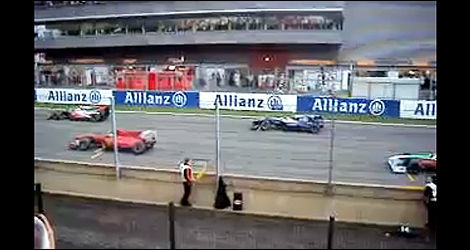
A recent fan video (still above) surfaced from the grid at the Belgian GP showing Felipe Massa’s car over the start line.
It’s been taken down since I started writing this last week, but if you’d seen it before FOM had it removed – you’d notice how Felipe Massa goes to his place on the grid start line with half his car over it at the flag drop.
Unfair advantage? Yes. A great day for Ferrari at Spa? Not exactly, but since this clip surfaced, the FIA had a look, and is investigating procedures to make this sort of thing less likely in the future.
There are many videos taken at a Grand Prix like this which surface for a bit, then disappear. Why?
In this case of direct fan feedback to the sport, it raises an interesting point : What happens in front of fans and their video cameras will be taken into consideration when reviewing an infringement of the rules.
Probably of more interest to the companies who spend millions each season to have their names appear on the side of these cars – having a fan video at the track shows engagement – precisely what fans are watching through their own viewfinders while creating tens, even hundreds of thousands of impressions of those brands worldwide through various online media – at zero additional cost.
While this sort of video which captures the exact moment a competitor broke the rules may have FIA officials concerned for the jobs their race marshals are doing, the added coverage a short YouTube video equals the equivalent of many, many more printed and broadcast images for the brands which sponsor the sport.
By my recollection, the video had been viewed well over 10,000 times at last count on Friday – not bad numbers. Getting someone to film one of your franchise’s star teams (Ferrari) for free and then publicizing the resulting trackside signage as well as the livery on the car through viral means does sounds like a marketing dream come true.
With online content’s commercialization through clickable ads, commercial trailers, and Ad Words, it wouldn’t seem too difficult for FOM’s lawyers to draft a slice of revenue for their stakeholders when such a video pops up from a fan. Why couldn’t Ferrari, or one of it’s partners, say, build a quick ad storyline from such a clip? Timely, engaging, and relevant – and self-promoting.
Why not embrace the trends personal video camera use has created? Fighting this trend via cease and desist ultimately stunts the emerging growth of the relevance of the fan in the sport, takes away from the available commercial exposure to team and venue sponsors, and reduces the transparency in the sport.
Not a good end result in this case, and especially so for 2012 in the country which invented the instant video replay . . .

